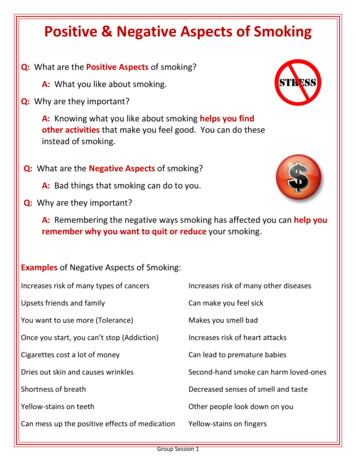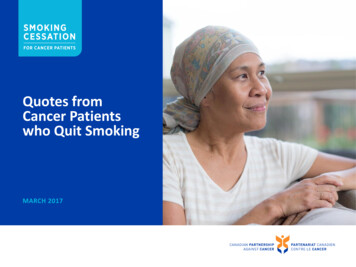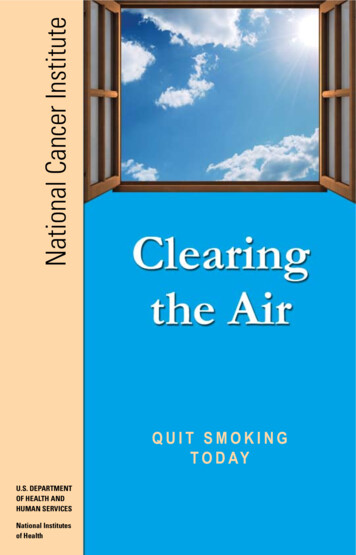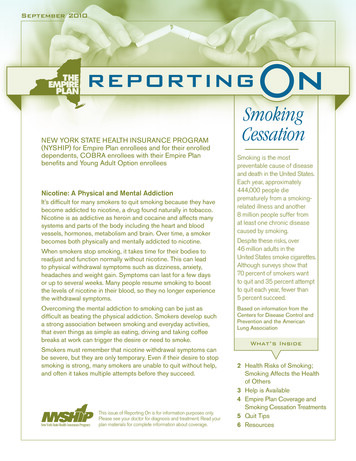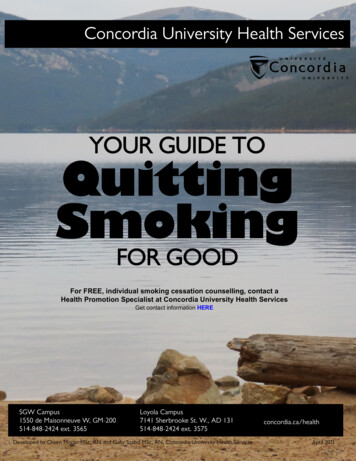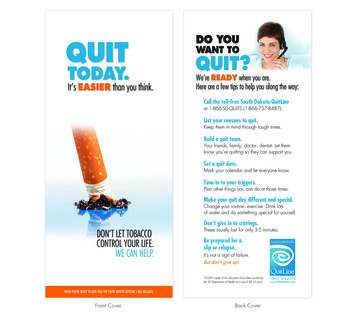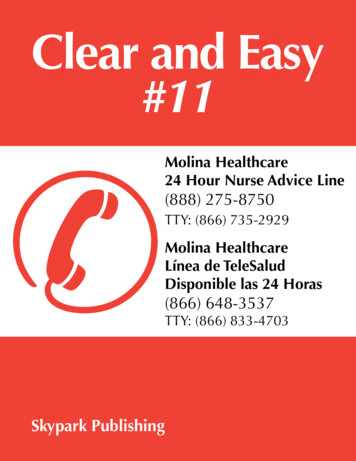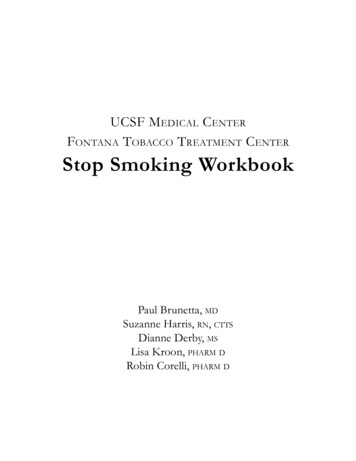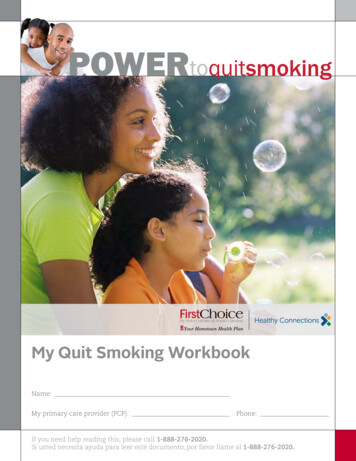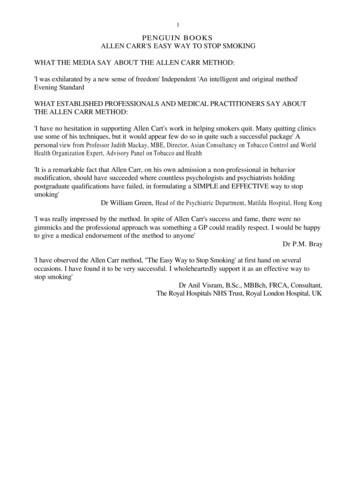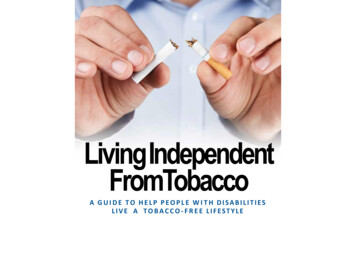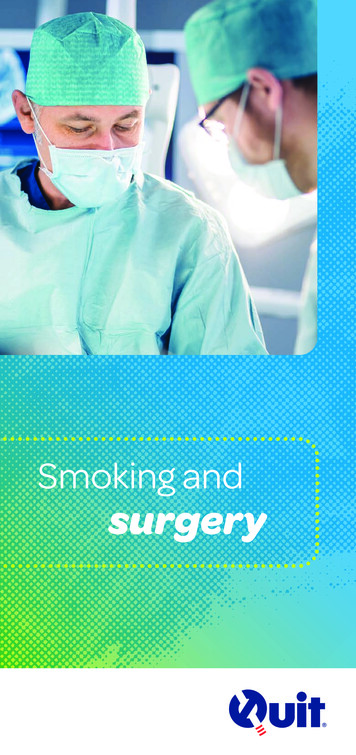
Transcription
Smoking andsurgery
Stoppingsmoking lowersyour risk ofserious problemsduring andafter surgery.Doctors stronglyrecommend stoppingsmoking before surgery.Before surgery –a good time to quitTo get the best outcome fromyour surgery, stopping smoking isan important step to take.Stopping smoking before surgery lowers yourrisk of serious problems and may mean: faster recovery less time in hospital, and less need for antibiotics.The chemicals in cigarettes affect how yourbody works and how well it copes during andafter surgery.The good news is, your body begins to repairitself as soon as you stop smoking.Stopping completely is the only way to reversethe damage done by cigarettes.Cutting down the number of cigarettes yousmoke in the weeks before surgery does notreduce the risk of complications.You can cut down before stopping smokingcompletely, but your body will only start torecover from the time you stop completely.The earlier youquit, the greateryour chances of agood recovery.23
Talk to your doctorand surgeonLet your doctor (general practitioner) and yoursurgeon know about your smoking.Every week you don’tsmoke before surgerywill help your bodycope better withsurgery and help yourrecovery afterwards.What are the risksfrom smoking?If you continue to smoke right up tothe time you have surgery, you will bemore likely to: reduce the oxygen supply to your heart andbody have difficulty breathing during and aftersurgery increase your risk of wound infection increase your risk of lung complications slow down or harm the healing of bones, skinand wounds reduce how well some pain-relieving andAlso tell them if you are using e-cigarettes(vaping) because it may increase the risk forwound complications.Make sure the hospital or your surgeon knowsall the medications you are taking when you areadmitted to hospital.Smoking andanaesthesiaWhen you have surgery, you usually have ananaesthetic drug so the operation can beperformed without pain.Smoking adds to the stress of surgery underanaesthesia by reducing the oxygen supply toyour heart and body and increasing the risk ofbreathing difficulties and infection.If you smoke, you are more likely to be admittedto intensive care and to need life support.If you have heart disease, whereyour supply of blood and oxygenis already reduced, then it is veryimportant to stop smoking at least24 hours before surgery.Even stopping smoking 24 hours before surgerywill help your body get the oxygen it needs.other drugs work.45
When you stop smoking After 12 hours almost all the nicotine is outof your bloodstream. Your blood pressureis more stable and your heart rate is slower.Your heart is less stressed so it needs lessoxygen to work properly. By 24 hours the level of carbon monoxide(CO) in your blood has dropped. Carbonmonoxide in cigarette smoke replaces someof the oxygen in your blood. As CO drops,your blood can supply more oxygen to yourheart, muscles and skin.After surgery –staying stoppedAfter surgery, it is important that youdo not start smoking again, even if youonly quit the day before surgery. Allowyour body to recover and heal properly.Any gains you made by quitting before surgerywill be lost if you start smoking again. Smokingmakes recovery harder by stressing your heartand lungs. By 3 to 4 weeks your body is better atSmoking can slow down and interfere with thehealing of bones, skin and other body tissues.Smoking narrows the tiny blood vessels inyour skin, restricting blood flow and oxygen towounds trying to heal. Infection is more likely. By 4 to 6 weeks you will be less likely toIn some types of surgery, skin at the site ofsurgery is more likely to die if you smoke.fighting wound infections, helping surgicalcuts to heal.cough. This helps your breathing underanaesthesia and reduces sharp pains fromcoughing for people with chest or abdominal(gut) surgery. By 8 weeks your risk of lung and breathingcomplications will be lower than a continuingsmoker. These risks include pneumoniaand other problems which make it harderto breathe. Your immune system andyour response to anaesthetic drugs willalso improve.Smoking makesrecovery harderby stressing yourheart and lungs.How well you recover may also depend on otherthings such as existing medical conditions.67
Staying smokefree means you: help your recovery can have a better response to medicaltreatments and less side effects cut your risk of heart attack and stroke help protect your eyesight, bone health,teeth and gums have a lower risk of lung disease and cancerPlanning to quitYou won’t be able to smokewhile you are in hospital,so take this chance to stopfor good.than if you keep smoking save a lot of money.Know your triggersA common reason to smoke is nicotine addiction:your body wants nicotine and starts havingcravings and withdrawal. Smoking is also often tiedto habits, feelings and being with friends.The best way to stop isa combined approach.Effective stop-smoking products toreduce cravings.Use a nicotine patch together with a fasteracting nicotine product (such as a lozenge,inhalator, spray or gum) OR a prescriptionmedicine (Champix or Zyban).When do you smoke?Talk to your doctor about what’s best for you.Having coffeeChampix, Zyban, and nicotine patches,lozenges and gum are available through thePharmaceutical Benefits Scheme (PBS). Thismeans they are much cheaper if they areprescribed by a doctor.With friendsAfter foodWatching TVWith alcoholWhen you’re angry, stressed or boredTailored support to help you manageyour triggers to smoke.Other times?Options include:Other emotions?Once you know your triggers to smoke, you canwork out strategies to help manage them.8PLUS Quitline 13 7848 your doctor, or online QuitCoach or phone messagingQuitTxt support –see www.quit.org.au/quittxt9
How do I call Quitline?Call 13 7848 for the cost of a local call on yourphone.Or you can arrange for Quitline to call you forfree. Text us on 13 7848 and we’ll call you back.Or simply enter your name and phone numberat www.quit.org.au/callback.Call the Quitline 13 7848If you are finding stoppingsmoking hard, or you are aheavy smoker, you’re notalone! Talking with a Quitlinecounsellor can increase yourchance of stopping smokingsuccessfully.What is Quitline?Quitline is a friendly telephone service. We careand we don’t judge. You don’t have to be readyto quit to call. We’ll work with you no matterwhere you’re at with your smoking. Your callis confidential. This means you don’t have togive your name if you don’t want to. Quitlinecounsellors are trained experts and understandthat stopping smoking is challenging.A Quitline counsellor will listen carefully andprovide practical, tailored advice just for you.10Or you, a worker or doctor can fill out a referralat www.quit.org.au/referral and send it off byfax or online.What happens on the phone?A typical first call to Quitline takes around10 to 20 minutes. It covers: how long you’ve been smokingwhy you want to stopunderstanding why you smokemanaging stressadvice on ways to stop smoking and how touse products.A Quitline counsellor will work with you to figureout how they can help you on future calls.If you would like, Quitline can call you back.Quitline can offer you up to six calls over amonth. This is the best way to help you toremain smokefree.Aboriginal Quitline counsellors arealso available.Quitline also uses interpreter servicesfor people from non-English speakingbackgrounds.11
For advice orpractical helpQuitline is a friendly, confidential telephoneservice that can offer you tailored informationand advice. For the cost of a local call fromyour phone, Quitline counsellors provideencouragement and support to help you stopsmoking.Go online: www.quit.org.auBuild your personal quit plan with easy-tofind information suited to you. You’ll find tips,distractions, a cost calculator and stories fromex-smokers.QuitCoach: www.quitcoach.org.auQuitCoach is a web-based computer programthat asks you questions and helps you quitby giving free personal advice tailored to yourneeds.QuitTxtQuitTxt provides regular SMS messagesincluding tips and encouragement to keep youon track throughout your quit attempt. To begin,all you need to do is register and complete abrief questionnaire at www.quit.org.au/quittxt.1211/2019 2019
8 Planning to quit The best way to stop is a combined approach. Effective stop-smoking products to reduce cravings. Use a nicotine patch together with a faster- acting nicotine product (such as a lozenge, inhalator, spray or gum) OR a prescription medicine (Champix
